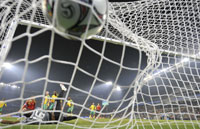Black-And-White South Africa and FIFA's World Cup
At first sight, FIFA's decision to hold the 2010 World Cup in the South African Republic seems logical. South Africa is the most developed country on the African continent and one of the thirty most successful countries in the world.

South Africa’s success is based upon the export of raw materials (precious metals, diamonds, uranium, etc.) as well as a unique combination of qualified, mostly white, management, and cheap black labor.
But despite the obvious success, the issue of suppression of blacks by white people is still acute. Slogans about redistribution of wealth, which for the most part is still concentrated in the pockets of white people, are gaining in popularity among the black population.
The first black president of the South African Republic, Nelson Mandella, was hoping that people of all races – white, black, and Indian – will be able to peacefully coexist in the country that got rid of apartheid 20 years ago.
But his hopes didn’t come true. The elimination of apartheid did not bring relief to the majority of the black population. Only those who became officials were able to get rich.
This increased the people’s discontent. In May 2009 another black man, Jacob Zuma, was elected President of South Africa.
During his presidential campaign, Zuma promised to redistribute wealth concentrated in the pockets of the white and “selected” black officials. A song called “Give Me a Machine Gun” was played during all his meetings with electorate.
However, Zuma still promises that violence won’t be allowed. In July and August of this year there were disturbances in the country, and multiple stores were robbed. Attacks on the farms that belong to white people became more frequent. Armed conflicts based on race occur in some places.
This looks like the precursor of a big storm. Anne Paton, a widow of the famous South African writer Alan Paton, recently wrote: “I love this country with a passion, but I cannot live here anymore… Among my friends and the friends of my friends, I know of nine people who have been murdered in the past four years.”
Fifty murders are committed here on daily basis, seven times more than in the USA. Local police are unable to rein in violence whose victims are blacks as well as whites.
In November of the last year, officials passed the “anti-terror legislation” aimed against radical organizations. For example, there is a law that entitles the police (who are mainly black) to engage in emergency actions towards the citizens of the areas provoking conflicts.
If Zuma fulfills his promise of wealth redistribution, South Africa is at risk of sharing the fate of Zimbabwe. After the expulsion of whites, Zimbabwe turned from a rather successful country into the world leader in inflation.
Replacing highly professional technical personnel that consists of white people only would be extremely difficult in South Africa. This would cause the South-African economy to fail.
There is no unanimous opinion among the white population on what to do next. English-speaking people prefer to leave the country, while the descendants of Dutch colonists (Boers) don’t want to leave. “We are Africans. Our ancestors founded the Cape Colony when there were no blacks here, and we want to live according to our laws, not theirs,” they explain.
Boers leave to the West of the country where the majority of the population are white and mixed and can protect themselves. Farmers are the ones that particularly suffer from the attacks. They live in settlements with tall fences and enforced security. Sometimes the farmers have to counterattack the black racists.
There is a tendency in South Africa for separation of the western “white” provinces whose residents want to found a separate country, Folstadt, with the capital in Orania. It’s not ruled out that soon South Africa will face a real threat of disintegration.
Today’s social and political anomalies and disorders can negatively affect not only safety of the participants and guests of the World Cup, but also the stability of the world economy.
It’s worth mentioning that South Africa is a world leader in precious metals exports. If something goes wrong, the prices for gold and platinum will skyrocket.
Will Pretoria manage to host the 2010 FIFA World Cup under these circumstances? Pravda.ru interviewed Gannady Shubin, Senior Associate of the Institute of Africa.
“The FIFA decision to hold the 2010 FIFA World Cup in South Africa seems strange. They must have come up with it under the influence of ex-president Nelson Mandela, a fighter against apartheid. Technically, the country is not ready for such a large-scale event. And it’s not limited to the stadiums.
Lack of electrical power and water can interfere with the event. Besides, the officials cannot provide safety for millions of tourists. The entire police force of South Africa will not be sufficient for providing security in Johannesburg alone, and the situation is not much better in Durban where the matches will be held.
There is a huge gap between rich and poor in South Africa. Poor people hate not only “rich whites,” but also “rich blacks” and millions of migrants from neighboring countries who “steal their jobs.”
A third of the population still lives in huts. It’s extremely difficult to obtain education that would allow them to earn a decent living. As a result, the crime level is very high. What’s happening in South Africa today could lead to a civil war.
I’m not sure if it would be a slow war where the country can formally preserve its unity, or a large-scale war where South Africa will be divided into several independent states. This may be possible because the borders between the provinces coincide with the ethnical borders.
In other words, South Africa is not the best location for holding an event on a world scale.
Sergey Balmasov
Pravda.Ru
Subscribe to Pravda.Ru Telegram channel, Facebook, RSS!





